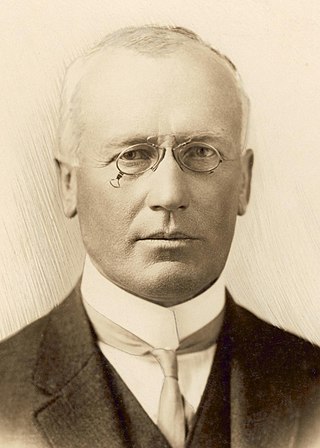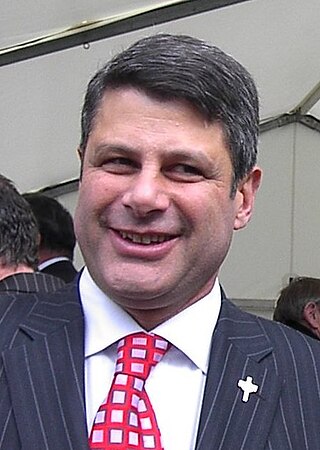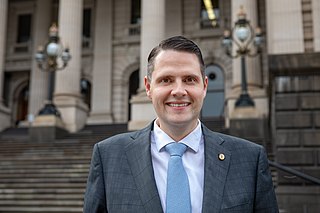
Sir William Hill Irvine was an Australian politician and judge. He served as Premier of Victoria (1902–1904), Attorney-General of Australia (1913–1914), and Chief Justice of Victoria (1918–1935).

William Alexander Watt was an Australian politician. He served two terms as Premier of Victoria before entering federal politics in 1914. He then served as a minister in the government of Billy Hughes from 1917 to 1920, including as acting prime minister during World War I, and finally as Speaker of the House of Representatives from 1923 to 1926.
Ian Macfarlan was the Deputy Leader of the Victorian Liberal Party during 1945. He was briefly commissioned as the 35th Premier of Victoria by the Governor and formed a government which brought about the end of the Dunstan Ministry.

Sir Thomas Bent was an Australian politician and the 22nd premier of Victoria.

Sir Alexander James Peacock was an Australian politician who served as the 20th Premier of Victoria.

John (Jack) Murray, Australian politician, was the 23rd premier of Victoria.

Sir John Bowser, Australian politician, was the 26th Premier of Victoria. He was born in London, the son of an army officer, and arrived in Melbourne as a child with his family. He grew up at Bacchus Marsh and when he left school got a job with the Bacchus Marsh Express. As a young man he went to Scotland and worked on newspapers while studying at University of Edinburgh. Returning to Australia, he settled in Wangaratta, where he farmed and managed the Wangaratta Chronicle, which he eventually bought.

Edmond John "Ned" Hogan was an Australian politician who was the 30th Premier of Victoria. He was born in Wallace, Victoria, where his Irish-born parents were small farmers. After attending a Roman Catholic primary school, he became a farm worker and then a timber worker, and spent some time on the goldfields of Western Australia.

The 2002 Victorian state election, held on Saturday, 30 November 2002, was for the 55th Parliament of Victoria. It was held to elect the 88 members of Victorian Legislative Assembly and 22 members of the 44-member Legislative Council.

Sir Albert Arthur Dunstan, KCMG was an Australian politician who served as the 33rd premier of Victoria from 1935 to 1945, and previously as the 3rd deputy premier of Victoria for five days in March 1935. A member of the Country Party, now the National Party, his term as premier was the second-longest in the state's history and the longest of any third-party premier. He was the first person to hold the office of premier in its own right, and not an additional duty taken up by the Treasurer, Attorney-General or Chief Secretary.
This is a list of members of the 18th Legislative Assembly of Queensland from 1909 to 1912, as elected at the 1909 state election held on 2 October 1909.

The 2018 Victorian state election was held on Saturday, 24 November 2018 to elect the 59th Parliament of Victoria. All 88 seats in the Legislative Assembly and all 40 seats in the Legislative Council were up for election. The first-term incumbent Labor government, led by Premier Daniel Andrews, won a second four-year term, defeating the Liberal/National Coalition opposition, led by Opposition Leader Matthew Guy in a landslide victory. Minor party the Greens led by Samantha Ratnam also contested the election.
The National Party of Australia – Victoria is a political party in Victoria, which forms the state branch of the federal Nationals. It represents graziers, farmers, miners and rural voters.

The 1907 Victorian state election was held in the Australian state of Victoria on Friday, 15 March 1907 to elect 45 of the 65 members of the state's Legislative Assembly. The other 20 seats were uncontested.
The Victorian Labor Party, officially known as the Australian Labor Party and commonly referred to simply as Victorian Labor, is the Victorian state branch of the Australian Labor Party (ALP). The branch is currently the ruling parting in the state of Victoria and is led by Jacinta Allan, who has served concurrently as premier of Victoria since 2023.

The 1908 Victorian state election was held in the Australian state of Victoria on 29 December 1908 to elect 40 of the 65 members of the state's Legislative Assembly. The other 25 seats were uncontested.

The 1904 Victorian state election was held in the Australian state of Victoria on 1 June 1904 to elect 67 members to the state's Legislative Assembly.

James Benjamin Kingsley Newbury is an Australian politician. He has been a Liberal Party member of the Victorian Legislative Assembly since November 2018, representing the seat of Brighton. Newbury is the currently the Shadow Minister for Environment and Climate Change, Equality, and the Manager of Opposition Business.

The 2026 Victorian state election is expected to be held on 28 November 2026 to elect the 61st Parliament of Victoria. All 88 seats in the Legislative Assembly and all 40 seats in the Legislative Council will be up for election, presuming there are no new electorates added in a redistribution.
The Liberal Party, often known simply as the Liberals, was the name used by a number of political groupings and parties in the Victorian Parliament from the late 19th century until around 1917.














